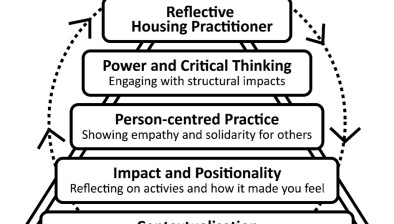Dr Kim McKee: Scotland’s commitment to housing education & professionalism

Dr Kim McKee
In light of last month’s launch of the new Housing Bill and ongoing developments with mandatory qualifications for housing professionals in England, Dr Kim McKee from the University of Stirling highlights the importance of housing education.
Following on from several well-documented tragedies within social housing in England, the Department of Levelling Up, Housing and Communities (DLUHC) is driving a programme of reform for social housing regulation. This includes directing the Regulator of Social Housing in England to consult on a new Competence and Conduct Standard for Social Housing (closed 2 April). These proposals introduce a new regulatory standard that will require senior managers and executives to have, or be working towards, a relevant minimal level qualification that covers prescribed criteria. The objective is to ensure housing professionals are given the relevant skills, knowledge, and behaviours they need to deliver high-quality, customer-focused services.
At a time when the housing sector is undergoing important changes, for example with the recent launch of the new Housing Bill in Scotland, there is no doubt that housing education has transformative potential, and can deliver benefits for individuals, employers, and tenants. It is also critical to ensuring that learning and development is provided to ensure that the workforce is given the relevant skills needed for the future housing sector.
What if any implications will these proposed changes have for Scotland? The value of housing education is already recognised in the Scottish context, for example through the CIH Scotland (2020) Housing Education in Scotland Report, This acknowledgement was reinforced by the recent launch of a ‘commitment’, which provides guidance on how housing organisations can demonstrate their support for professionalism and education through ongoing investment in their staff’s training, qualifications and Continuing Professional Development (CPD). There is also a working group supporting CIH Scotland in their activities, bringing together key stakeholders from across the sector, around their shared interests in education.
This group has worked collaboratively to provide online resources, encouraging young people to consider a career in housing, and to showcase the different learner journeys and career options available to them. Housing is a fulfilling career choice and is both rewarding and highly varied in the opportunities it can offer.
When an invited panellist at the recent SHARE annual conference, I outlined some of the tensions around mandatory qualifications. Most importantly, there are potential implications for equality, diversity, and inclusion within the workforce. For some housing professionals, committing the time required for mandatory qualifications is more challenging. This includes those with caring responsibilities, and individuals with impairments or long-term health conditions. For those close to the end of their career, having to undertake a qualification may risk driving them from the workforce early. The loss of experienced professionals is a potential unintended consequence of making qualifications mandatory that needs to be monitored and actions taken to mitigate negative impact. Such action requires effective data being captured by the sector.
Many housing professionals who will be required to undertake this mandatory qualification in England will likely have been away from study for some years, if not decades – they will need support with their learning and time to build their academic, digital skills and experience of reflective practice. This is where Scotland’s qualification providers can bring their expertise to the table – as they have decades of experience in this field, and are already teaching students across the UK.
A leading example of this approach is the postgraduate Housing Studies programme at the University of Stirling. We offer an inclusive programme, integrating professional practice with academic rigour. Our approach to teaching and learning involves work with practitioners within a research active teaching team, committed to influencing policy and practice (in Scotland and beyond). We are committed to applied learning, developing key skills and student employability. We are early adopters of blended learning, and the accessibility offered by online delivery remains central to the design of our course. It allows our students to access their learning from any location, and we also combine a mix of live and asynchronous teaching approaches to maximise flexibility. Our online element is also supplemented with face-to-face sessions on campus to support networking and the development of peer-support.
Interested in learning more about what housing education can offer you? Please join our online ‘taster session’ on the 1st of May at 10am where we can tell you all about the postgraduate diploma in Housing Studies at the University of Stirling. We are passionate about housing and have been successfully supporting learners on our programme for more than 40 years.







